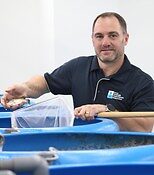[Seminar] The R&D pathway to growing aquaculture through innovative technologies

Date
Location
Description
Seminar: The R&D pathway to growing aquaculture through innovative technologies
Dean R. Jerry*
Tropical Futures Institute, James Cook University Singapore, Australian Research Council Hub for Supercharging Tropical Aquaculture through Genetic Solutions, James Cook University, Townsville, Australia. Email: dean.jerry@jcu.edu.au
Abstract:
As the farming of aquaculture species matures the industry is progressively adopting innovation to increase productivity and lower risk due to disease and environmental perturbations. Technologies based on artificial intelligence and machine learning, rapid diagnostics, biosensors, and integration of genomic data are being developed in efforts to obtain precise information on the health and well-being of the cultured species, along with allowing finer-scale management of the production system. Whilst many of these innovations are still in development and not yet implemented into commercial practice, they have defined new areas and opportunity of industry-academic collaborative research and transferred technologies from other industries into the aquaculture sector. This presentation will focus on several of these innovative technologies (machine learning, genomic prediction, microbiomes and environmental DNA) and how they are changing the aquaculture landscape.
Machine learning (ML) is a form of computational artificial intelligence whereby computer algorithms that predict or recognize patterns in data improve automatically through experience and feedback. ML is being applied to many diverse applications in aquaculture including automated phenotyping, biomass prediction, identification and classification, pathogen detection, behavioral analyses (ie associated with feeding), and water quality prediction, to name a few applications. The application of ML to the aquaculture context has the potential to unpack the complexity of aquaculture systems and provide an intelligence lenses to farmers on what is going on under the water and how it relates to the environment during production.
Genomic prediction is considered the “gold-standard” in selective breeding and involves the genotyping and training of thousands of genome-wide DNA markers to predict the genetic merit of an individual for a trait of interest. Genomic prediction has been shown to increase the accuracy of predicting the breeding value (EBV) of individuals over that of traditional pedigree-based selection by upwards of 10-20% and allows efficient selection practices to be applied for traits hard to measure using phenotypic selection (e.g carcass quality, disease tolerance).
The microbiome comprises the microbial community inhabiting the gut and surrounding environment of a species. The microbiome can relatively easily be assayed using next-generation sequencing technologies and recent studies have linked the community structure of the microbiome to productivity and disease in aquaculture systems. In some cases it has been shown that the microbiomes of high-yielding systems is differentiated from those with lower yields. Understanding the microbiome and how it changes with the environment and industry management practices also offers the potential to predict using ML tools when a production system is heading towards a particular outcome (like a disease outbreak or loss of growth performance) and when such tools are developed will allow farmers for the first time to intervene in intelligent ways to reverse declines in their production systems.
Environmental DNA (eDNA) represents samples that are collected from the environment (e.g water column) that contain cells and traces of DNA from organisms that inhabit that environment. In the context of aquaculture, eDNA approaches provide the potential to monitor background pathogen presence and loadings before they cause disease, as well as in association with environmental data, predict the conditions that may lead to disease outbreaks. eDNA approaches can be targeted towards the detection of an individual pathogen, or when combined with metabarcoding sequencing technologies the entire pathobiome in a system (or host individual) and are increasingly being investigated to understand and monitor host-pathogen dynamics in aquaculture.
These technologies all have the potential to revolutionize aquaculture production by finally unpacking the hidden forms of variance that are inherent in aquaculture systems. Increased investment and research effort is required though to refine the technologies and bring them to cost-levels and implementation levels relevant to industry uptake.
Biography:
Prof Dean Jerry (https://research.jcu.edu.au/portfolio/dean.jerry/) is the Foundation Director of the Tropical Futures Institute, James Cook University (JCU) Singapore, Director of the Australian Research Council Hub for Supercharging Tropical Aquaculture through Genetic Solutions, and Professor in Aquaculture at James Cook University. He also was until recently the Dean of Research JCU Singapore, foundation Deputy Director of the Centre for Sustainable Tropical Fisheries and Aquaculture, and Academic Head of Aquaculture and Fisheries at JCU.
Prof Jerry is extremely passionate about the potential for aquaculture to grow as a major food production industry and has been working with this emerging sector for over 20 years, first as a research scientist where he was involved in some of the first programs in aquaculture worldwide to attempt to selectively breed aquatic farmed species (Kuruma and black tiger shrimp, pearl oysters, barramundi and freshwater crayfish).
Prof Jerry is considered a global leader in the knowledge generation and application of genetic breeding technologies to aquaculture species and has partnered with many companies in Australia, Oceania and southeast Asia, to improve the efficiency of production through targeted genetics R&D. He also has instigated and has active interests in research programs related to disease and aquatic animal health, environmental DNA, microbiomes and machine learning. He has published 160+ scientific papers, 1 book and managed over 30 industry-linked research partnerships valued at $42+ million.
Zoom link:
https://oist.zoom.us/j/93477348797?pwd=QmREd0ZyNEpGYnRKZ2lDQy82YTQ4UT09&from=addon
Meeting ID: 934 7734 8797 Pass code: 449590
Subscribe to the OIST Calendar: Right-click to download, then open in your calendar application.



